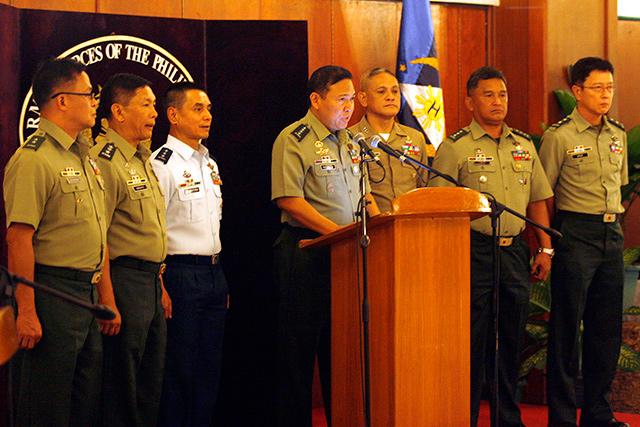From the Daily Tribune (Jul 12): IPSP ‘Bayanihan’ a failure, admits AFP chief
More than two years after the implementation of the military’s Internal Peace and Security Plan (IPSP) “Bayanihan,” which is designed to render communist insurgency irrelevant by 2016, the strength of the communist New People’s Army (NPA) remained at more than 4,000 or almost the same when the campaign was launched in 2011.
This was admitted by no less than Armed Forces of the Philippines (AFP) chief of staff Gen. Emmanuel Bautista during a press conference after presiding over a command conference at Camp Aguinaldo yesterday.
Bautista said that the strength of the NPA is pegged at present at “a little more than 4,000.”
Military data showed that the NPA has an estimated strength of 4,043 in end 2011. The IPSP “Bayanihan” was launched January 2011. In end 2010, the AFP placed the NPA strength at 4,384.
It was gathered that as of this time, the NPA manpower is pegged at 4,070.
In spite of this, Bautista claimed significant gains brought about by IPSP “Bayanihan,” which is his brainchild during his stint as AFP deputy chief of staff for operations or J3.
“We have neutralized 323 NPAs, most of them surrenderees and that is how we want it (for them) to abandon (armed) struggle,” Bautista said.
Firearms exchanges, Bautista said, is at 203 to 47 in favor of the government.
“These are not our criteria now for measuring our performance...we are looking at the peaceful condition in different localities...if there is development, if there is economic progress in the areas that is the ultimate,” Bautista said.
Bautista also mentioned the declaration of 29 provinces as free from communist influence. He said three more provinces will be turned over to the local government within the year.
“Our intent is render armed struggle irrelevant, we have significant number of surrenderees from the ranks of the NPA, notwithstanding, there have been continuous recruitment,” Bautista said.
Bautista said that the NPA is most active in Eastern Mindanao, specifically in Compostela Valley and adjacent provinces.
“The campaign remains on track, the ‘Bayanihan’ timeline of 2016 we will win the peace,” Bautista said.
AFP spokesman Brig. Gen. Domingo Tutaan Jr. said that the NPA took advantage of the people’s misery during calamities in their recruitment. He particularly cited the NPA’s recruitment in some parts of Mindanao during the onslaught of typhoon “Pablo.”
http://www.tribune.net.ph/index.php/nation/item/16559-ipsp-bayanihan-a-failure-admits-afp-chief
The news was relayed to the BTC chair Mohagher Iqbal in Cotabato City. He was at the thick of preparation for the resumption of peace talks in Kuala Lumpur.
BTC has 15 commissioners, eight from the MILF including the chair, and seven from the government. However, they agreed among themselves that they will work for the common interests of the Bangsamoro who they are committed to serve.
Five of the commissioners hailed from Sulu (Abdulla Camlian, Raissa Jajurie, Ambassador Akmad Sakkam, and three-termer Asani Tammang), three from Lanao (Maulana Alonto, Akmad Benito, and Said Sheik), two from Maguindanao (Iqbal and Johira Wahab), two from the indigenous tribes (Melanio Ulama and Froilyn Mendoza) and one native Christian (Peter Eisma).
Maguindanao is the largest Moro tribe in terms of population, followed by Maranaos and then Tausog of Sulu.
The amount was part of the P100 million initial budget earmarked for the BTC to cover administrative and operation expenses from March 15, this year when the 15-man commissioners were appointed by President Benigno Aquino III.
BTC Executive Director, who requested not be named yet, told Luwaran that he personally thanked at least two cabinet secretaries, Teresita “Ging” Deles and Butch Abad for their help in making the fund available for the BTC, which had met thrice, first by government expenses and the other two shouldered by the Center for Humanitarian Dialogue (CHD).
He also thanked three personnel under Secretary Deles of the Presidential Adviser on the Peace Process (OPAPP) who helped the BTC personnel in the entire process namely, Antonio Florida, Louie Montalbo, Rosalie Romero and their entire staff.
He disclosed that another meeting of the BTC would be scheduled right after the meeting in Kuala Lumpur from July 8-11. The parties would discuss the three annexes (power-sharing, wealth-sharing, and normalization) which have been a nightmare for the last one year since July last year.
When asked for the immediate next release of the remaining budget, he said, “We are now starting to figure out our next move especially if the parties sign the three sticky points in the talks.”
http://www.luwaran.com/


